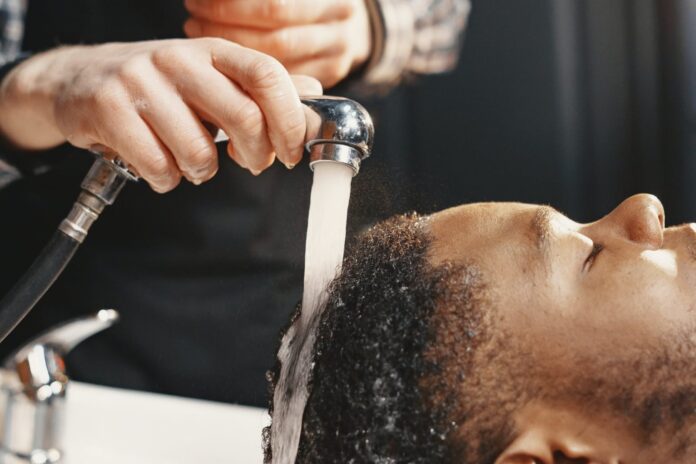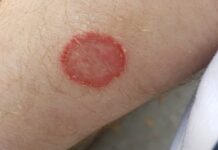
- On average, Brits wash their hair every 2-3 days, but experts claim this may be contributing to dandruff
- Over using hair products can clog pores and reduce the amount of oil produced, drying out and damaging hair
- Shampooing too often can lead to dehydration and breakage in your hair as well as limit hair growth
- Soft water is the best for those with thinning hair or straight hair are more prone to oily hair
- Afro hair should be washed around 1-2 times a week because it can be prone to damage from drying out and the oil is required to keep hair soft and curly
Navigating your hair washing schedule to maintain the healthiest locks can be difficult, and it’s hard to know which best practises should be adhered to.
Mira Showers has shed light on the most frequently asked hair questions and collaborated with Abbas Kanani, a Pharmacist at Chemist Click, to reveal how to correctly take care of your hair while diving deeper into the different hair types and how to care for them. Mira Showers also uncovered where the hard water capitals are in the UK – the towns and cities where the type of water might have an effect on hair too.
How often should women wash their hair?
With 156,000 Google searches per year, how often should women wash their hair is the most confusing topic when it comes to haircare. According to Abbas, there are several factors to consider, such as what shampoo you use, the type of hair you have and how much oil your scalp produces.
How often should women wash their hair is the most confusing topic when it comes to haircare. According to Abbas, there are several factors to consider, such as what shampoo you use, the type of hair you have and how much oil your scalp produces.
“Most people can go 2-3 days without washing their hair, however, if your scalp produces excess oil, it may need washing every 1-2 days. Those with thinning hair or straight hair are more prone to oily hair. This is because thin and straight hair lack texture, allowing oil to coat hair strands. Afro hair should be washed less, around 1-2 times a week. This is because afro hair is prone to damage from drying out. Oil is required to keep hair soft and curly.
After a workout where you have produced sweat, you should wash your hair to remain hygienic. The same applies to other physical activity that has caused your hair to become dirty. However, to avoid damage to the hair, you should avoid using shampoo with every wash and use water on its own.”
How often should men wash their hair?
With 3,600 google searches per year, men are also bamboozled at how often they should be washing their hair. With additional concerns like premature hair loss, do the same rules apply to men?
According to Abbas, “2-4 times a week is what is recommended for men, however, if you are using hair products, this can clog pores and reduce the amount of oil produced. Lack of oil can dry out and damage hair.”
Abbas also added “Shampooing hair on a frequent basis is not likely to contribute to baldness.”
How often should people with dandruff wash their hair?
Most of the time, dandruff is caused by a dry scalp and with 1,800 yearly Google searches, a lot of sufferers are looking for answers on the best ways to improve it.
Abbas comments that “frequent washing is likely to make dandruff worse. However, not washing often enough can cause scalp itchiness, which can also make dandruff worse. My advice would be to use a medicated anti-dandruff shampoo 2-3 times a week and rinse your hair with water 2-3 days a week to get rid of the flakes.”
How often should people trying to grow their hair wash it?
How ‘often should people trying to grow their hair wash it’ is the most common concern for those interested in hair growth.
Abbas puts the myth to bed, revealing that “the frequency that you wash hair is unlikely to have an impact on your hair growth. The only added benefit is the heat drawn to the head, which can help to stimulate growth from follicles, but this can be done without a shower.”
However, despite this, excessive shampooing can cause dehydration and lead to breakage in your hair.
Abbas suggests “Investing in a hypoallergenic or natural shampoo, and a shower filter (to reduce the chlorine levels in the water). You should massage your scalp frequently, use a gentle comb to do this, and avoid heat from straighteners and hair dryers, as this can also damage hair follicles.”
What water is the best for hair care, hard or soft?
It’s not only how frequently we wash our hair that can have an impact but also the type and quality of the water we’re using. Hard water does not have any serious effects on your body, but it does have an effect on your hair. This is because the minerals which are found in hard water will mix with shampoo to form a salt. This will leave a residue on the surface of your hair that can block moisturisers in your conditioner from being absorbed. This can contribute to dry skin and hair, itchy scalp, leaving hair prone to tangles and vulnerable to breakage, which may eventually result in thinning hair.
According to Abbas, “harsh chemicals from certain shampoos and water may cause hair damage that can contribute to poor hair growth.”
Ipswich has the hardest water in the UK with a water level of 368 mg/l, followed by Hull and Stevenage with water hardness of 358 mg/l and 356 mg/l respectively.
The top 5 hard water capitals of the UK
| Rank | Location | Water Level (mg/l) | Water Hardness Level | Supplier |
| 1 | Ipswich | 368 | Hard | Anglian Water |
| 2 | Hull | 358 | Hard | Yorkshire Water |
| 3 | Stevenage | 356 | Hard | Affinity Water |
| 4 | Luton | 342 | Hard | Affinity Water |
| 5 | Reading | 338 | Hard | Thames |
The top 5 soft water capitals of the UK
While hard water is abundant in minerals including calcium, iron and magnesium, soft water is low in these minerals, meaning it is more suited to hair washing.
With less calcium in your water supply, soft water impacts the texture of your hair. It can make it soft and shiny and requires less shampoo and conditioner to achieve a thicker lather. This makes it more adept to hair washing with less products that may inflict damage.
Help keep news FREE for our readers
Supporting your local community newspaper/online news outlet is crucial now more than ever. If you believe in independent journalism, then consider making a valuable contribution by making a one-time or monthly donation. We operate in rural areas where providing unbiased news can be challenging. Read More About Supporting The West Wales Chronicle

























